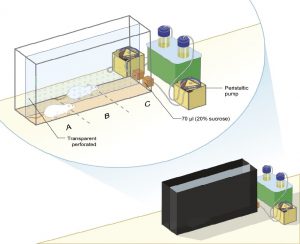In our research we are focusing on regulation and dysregulation of attention and social cooperation processes, both are important for adaptivity and daily functioning, in health and disease.

Investigating auditory sustained attention (ASAT) we are interested in disease conditions such as attention-deficit-hyperactivity-disorder (ADHD) and post-traumatic stress disorder (PTSD). We are also examining the modulation of ASAT by circumstantial life conditions such as fatigue, sleep deprivation etc.
This ongoing research is conducted by applying translational-neuroscience approach including behavioral, biochemical and electrophysiological methods. We investigate ASAT in rodent models using an automated box, and in human subjects using a newly EMG-based instrument that is under R&D in our lab (patent reg. #63524).
Our human instrument sub-serves as an objective physiological tool aimed to evaluate ADHD symptoms, stimulants (e.g. Methylphenidate/Ritalin) treatment efficacy, dysregulation, and executive functions.

Dysregulated social cooperation performance may serve as an indication for psychopathology, such as Autism Spectrum disorder (ASD) and Alzheimer’s Disease (AD). Currently, we are examining the interplay between social cooperation dysregulation and neurodegeneration models, with the kind support of the Allen and Jewel Prince Center.
Using our automated social cooperation maze, we found irregulating processes across trans-generational inheritance that manifested in two distinct sub-populations of low- and high- performers, that were supported by different proteomics and RNA – seq profiles.
Mechanistically, by using telemetric electrophysiological recording in behaving rats and cutting-edge EEG and fNIR spectroscopy tools in humans, we are incorporating a translational approach into the study of both auditory sustained attention (ASAT) and social cooperation.
Excellent candidates are encouraged to apply for MSc and PhD positions:
Avital@technion.ac.il (Avi)
Shlomit.mizrachi@gmail.com (Shlomit)

